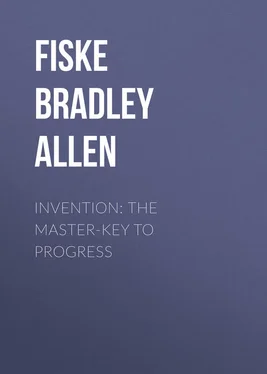Bradley Fiske - Invention - The Master-key to Progress
Здесь есть возможность читать онлайн «Bradley Fiske - Invention - The Master-key to Progress» — ознакомительный отрывок электронной книги совершенно бесплатно, а после прочтения отрывка купить полную версию. В некоторых случаях можно слушать аудио, скачать через торрент в формате fb2 и присутствует краткое содержание. Жанр: foreign_antique, foreign_prose, на английском языке. Описание произведения, (предисловие) а так же отзывы посетителей доступны на портале библиотеки ЛибКат.
- Название:Invention: The Master-key to Progress
- Автор:
- Жанр:
- Год:неизвестен
- ISBN:нет данных
- Рейтинг книги:4 / 5. Голосов: 1
-
Избранное:Добавить в избранное
- Отзывы:
-
Ваша оценка:
- 80
- 1
- 2
- 3
- 4
- 5
Invention: The Master-key to Progress: краткое содержание, описание и аннотация
Предлагаем к чтению аннотацию, описание, краткое содержание или предисловие (зависит от того, что написал сам автор книги «Invention: The Master-key to Progress»). Если вы не нашли необходимую информацию о книге — напишите в комментариях, мы постараемся отыскать её.
Invention: The Master-key to Progress — читать онлайн ознакомительный отрывок
Ниже представлен текст книги, разбитый по страницам. Система сохранения места последней прочитанной страницы, позволяет с удобством читать онлайн бесплатно книгу «Invention: The Master-key to Progress», без необходимости каждый раз заново искать на чём Вы остановились. Поставьте закладку, и сможете в любой момент перейти на страницу, на которой закончили чтение.
Интервал:
Закладка:
It may seem obvious that this question should be answered in the negative, and so it unquestionably should be. But there always has been much cloudiness as to what constitutes invention in our own minds; and it must be admitted that the dividing line is not immediately obvious between invention and the art of meeting difficulties with resourcefulness, or between invention and the act of solving any of the perplexing riddles of our daily lives.
It may be declared with confidence, however, that the difference between invention and any one of these other acts is that, while invention ends in performing such acts, it begins with an exercise of the imagination. A man who designs an engine to fulfil a stated purpose, who solves any problem whatever that is presented to him from outside, simply accomplishes a task that is given to him to accomplish; whereas, while the inventor accomplishes a similar task, he does it as a second step in a task that was not given him to accomplish, but that he himself had pictured to himself. The act of inventing consists of three separate acts – the act of conceiving, the act of developing, and the act of producing. Of these three acts, that of conceiving is obviously not only the first, but also the most important, distinctive and unusual.
For every real invention, there have been countless constructive acts. In the invention of the bow and arrow, the conception was probably instantaneous and unbidden. The subsequent work of developing the conception into material and practical shape was probably one of long duration, consisting of many acts, accompanied with many difficulties and disappointments, and accomplished finally in the face of much active and passive opposition.
The Old Stone Age gradually developed into the New Stone Age at different times in different localities, as successive improvements in implements were made. The New Stone Age was distinguished from its predecessor mainly by the fact that the principal weapons and utensils were formed into regular shapes, polished into smoothness, and in many cases ground to sharp points and keen cutting edges. These improvements made the implements more effective both as weapons and as utensils, by facilitating not only cutting but penetration.
How much invention was needed to make these improvements, it is not easy to decide; but probably only a little was required, and that of an order not very original or high; for the improvements were rather in detail than principle. Perhaps their character can be best indicated by saying that they were improvements, rather than inventions of a basic kind.
It may here be pointed out that the act of improving upon an invention already existing may be almost wholly a constructive act, performed on a visible and tangible material object, and not on a picture made by the imagination on the mind. In such a case, the act of improving belongs rather in the category of engineering than of invention, for the reason that it involves only a slight use of the imagination. It may also be pointed out, however, that a mere improvement may be, and sometimes has been an invention of the highest order. As a rule, of course, basic inventions have been the most brilliant and also the most important.
But it was not only by polished instruments of stone and bone that the New Stone Age was characterized; for we find in the records which our ancestors unintentionally left us, many evidences that they had invented the arts of making pottery, of spinning and weaving, and of constructing houses of a simple kind. This Age was characterized by many improvements besides those relating to articles of stone, and was a period far in advance of its predecessor on the march to civilization. It was marked by the domestication of animals and plants, the tilling of the soil, and a gradual change from a purely savage and nomadic mode of life. This change was first to a pastoral life, in which men lived in fixed habitations and tended their flocks; thence to an agricultural life, in which men cultivated the ground over large areas and grew crops of cereals and vegetables; and then to a still more settled existence, in which men congregated in villages and towns. Certainly, the race had taken the first steps, and had started on the path which it has since pursued.
In order to make the start and to proceed afterwards in the line begun, many physical, mental and spiritual attributes were needed and employed, that mere brutes did not possess, and because of which the civilization of the Old Stone Age had been begun and gradually developed. Of these faculties, those principally characteristic seem to have been mental; and among those faculties, invention, reason, construction and memory seem to have been the most important. It would be unreasonable to declare any one of those faculties to have been more important than the others; but it can hardly be denied that the first steps in the march of progress should be credited to invention. Clearly, it was the weapons and utensils of the Old Stone Age that made possible the subduing and subsequent domestication of certain animals, such as the horse, the cow, the dog, the sheep and the goat.
It may be pointed out, in passing, that many animals have not been domesticated even at this late day – such as the tiger, the eagle and the bear. But, equally, certain tribes of men have not been domesticated. It may be that in both the undomesticated men and the undomesticated brutes, the mind is of such a character that it cannot assimilate even the first grains of knowledge, or make any effort whatever of an inventive character.
There was one invention that was probably made in the Old Stone Age, which must have needed considerable inventiveness to be developed as highly as it was developed during the Old and New Stone Ages, and that was language. The origin of language is, of course, hidden in the impenetrable mystery of the childhood of the race; and it may be that language was an original attribute of man. If we reason, however, that the development of language must have been a continuing act from the first, inferring it from the fact that it has been a continuing act from the dawn of recorded history until now, and if we suppose that it had a rise and a growth like those of other arts, we may reasonably conclude that some man invented the plan of making his wants known by the use of vocal sounds, uttered in accordance with a preconcerted code; that the invention was only partially successful at first, and that it was afterwards improved. That language was not a natural gift, but rather the result of an invention and subsequent development, is suggested by the fact that a child has to be taught to speak, but does not have to be taught to exercise his natural functions, such as breathing, eating, drinking, walking, etc.
Which was the first invention ever made by man, there is, of course, no means of ascertaining; but it seems obvious that that of language must have been among the first. The invention of weapons we may easily imagine to have been actually the first, called for by the necessity of defense against wild beasts and other men. Following the defense by individual men of their individual lives, it seems logical to suppose that a man and his wife, a man and his brother, and then groups of men, banded together in their common defense against common foes. To further their joint action, what would be more valuable than a language consisting of vocal sounds, arranged in accordance with a simple code, as a means of conveying information, issuing warnings, and giving signals in emergencies, to insure concerted action?
That language should later be used for manifold other purposes would be most natural; for many other arts have been invented primarily to further man's first aim, the preservation of his life, and have afterwards been employed for other purposes. The uses of clothing, houses, knives, guns and of nearly all weapons are cases in point.
Читать дальшеИнтервал:
Закладка:
Похожие книги на «Invention: The Master-key to Progress»
Представляем Вашему вниманию похожие книги на «Invention: The Master-key to Progress» списком для выбора. Мы отобрали схожую по названию и смыслу литературу в надежде предоставить читателям больше вариантов отыскать новые, интересные, ещё непрочитанные произведения.
Обсуждение, отзывы о книге «Invention: The Master-key to Progress» и просто собственные мнения читателей. Оставьте ваши комментарии, напишите, что Вы думаете о произведении, его смысле или главных героях. Укажите что конкретно понравилось, а что нет, и почему Вы так считаете.












